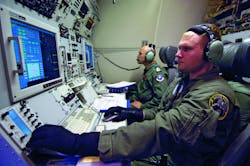University researchers to develop reconfigurable processors for streaming data in RF and microwave uses
ARLINGTON, Va. – U.S. military researchers needed to develop high-throughput streaming-data processors that reconfigure themselves within 50 nanoseconds. They found their solution from the University of Southern California (USC) in Los Angeles.
Officials of the U.S. Defense Advanced Projects Agency (DARPA) in Washington announced a $9 million contract to USC on Friday for the Processor Reconfiguration for Wideband Spectrum Sensing (PROWESS) project.
On the PROWESS contract, USC researchers will try to develop reconfigurable processors that provide autonomous RF and microwave systems with situational awareness about complex and uncertain electromagnetic environments.
High-throughput streaming-data processors can enable just-in-time synthesis of receiver processing pipelines in uncertain environments where pre-programmed solutions are likely to fail, DARPA researchers say.
PROWESS is anticipated to combine emerging high-density reconfigurable processing arrays with embedded real-time schedulers to expose new architectural tradeoffs that deliver fast program switching and high-compute density.
Commercial and military demands on the electromagnetic spectrum (EMS) are driving radio frequency (RF) systems to operate in increasingly congested and complex environments, researchers explain. Spectrum sensing in these conditions drives the demand for edge processing beyond the capacity of today’s devices.
Related: Enabling technologies for image and video processing
The PROWESS project seeks create reconfigurable processors to improve RF autonomy by enhancing spectrum sensing, which enables RF systems to optimize to actual spectrum conditions and react to interference in real time, DARPA researchers say.
These kinds of computer architectures potentially offer significant benefits for spectrum sensing and related applications, particularly when systems must operate in dynamic and sometimes-confusing environments. PROWESS expects to focus on the development of runtime reconfigurable processing hardware and support software.
On this contract USC experts will do the work in Arlington and Vienna, Va.; Cambridge, Mass.; Los Angeles; and Brooklyn, N.Y., and should be finished by November 2026. For more information contact USC online at https://news.usc.edu/tag/research, or DARPA at www.darpa.mil.
About the Author
John Keller
Editor-in-Chief
John Keller is the Editor-in-Chief, Military & Aerospace Electronics Magazine--provides extensive coverage and analysis of enabling electronics and optoelectronic technologies in military, space and commercial aviation applications. John has been a member of the Military & Aerospace Electronics staff since 1989 and chief editor since 1995.
